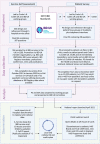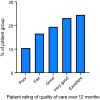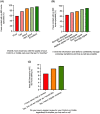Inflammatory bowel disease patient-reported quality assessment should drive service improvement: a national survey of UK IBD units and patients
- PMID: 35770866
- PMCID: PMC9541797
- DOI: 10.1111/apt.17042
Inflammatory bowel disease patient-reported quality assessment should drive service improvement: a national survey of UK IBD units and patients
Abstract
Background: Healthcare service provision in inflammatory bowel disease (IBD) is often designed to meet targets set by healthcare providers rather than those of patients. It is unclear whether this meets the needs of patients, as assessed by patients themselves.
Aims: To assess patients' experience of IBD and the healthcare they received, aiming to identify factors in IBD healthcare provision associated with perceived high-quality care.
Methods: Using the 2019 IBD standards as a framework, a national benchmarking tool for quality assessment in IBD was developed by IBD UK, comprising a patient survey and service self-assessment.
Results: 134 IBD services and 9757 patients responded. Perceived quality of care was lowest in young adults and increased with age, was higher in males and those >2 years since diagnosis. No hospital services met all the national IBD standards for recommended workforce numbers. Key metrics associated with patient-reported high- quality care were: identification as a tertiary centre, patient information availability, shared decision- making, rapid response to contact for advice, access to urgent review, joint medical/surgical clinics, and access to research (all p < 0.001). Higher numbers of IBD nurse specialists in a service was strongly associated with patients receiving regular reviews and having confidence in self-management and reporting high- quality care.
Conclusions: This extensive patient and healthcare provider survey emphasises the importance of aspects of care less often measured by clinicians, such as communication, shared decision- making and provision of information. It demonstrates that IBD nurse specialists are crucial to meeting the needs of people living with IBD.
© 2022 The Authors. Alimentary Pharmacology & Therapeutics published by John Wiley & Sons Ltd.
Figures





Comment in
-
Editorial: quality assessment in IBD in high-resource countries can lead to quality improvement clues for IBD management worldwide.Aliment Pharmacol Ther. 2022 Aug;56(4):741-742. doi: 10.1111/apt.17072. Aliment Pharmacol Ther. 2022. PMID: 35879897 No abstract available.
-
Editorial: quality assessment in IBD in high resource countries can lead to quality improvement clues for IBD management worldwide-authors' reply.Aliment Pharmacol Ther. 2022 Aug;56(4):743. doi: 10.1111/apt.17077. Aliment Pharmacol Ther. 2022. PMID: 35879903 No abstract available.
References
-
- King D, Reulen RC, Thomas T, Chandan JS, Thayakaran R, Subramanian A, et al. Changing patterns in the epidemiology and outcomes of inflammatory bowel disease in the United Kingdom: 2000‐2018. Aliment Pharmacol Ther. 2020;51(10):922–34. - PubMed
-
- Crohn's & Colitis Australia . Australian IBD standards: Standards of Healthcare for People with Inflammatory Bowel Disease in Australia. 2016.
Publication types
MeSH terms
LinkOut - more resources
Full Text Sources
Miscellaneous
